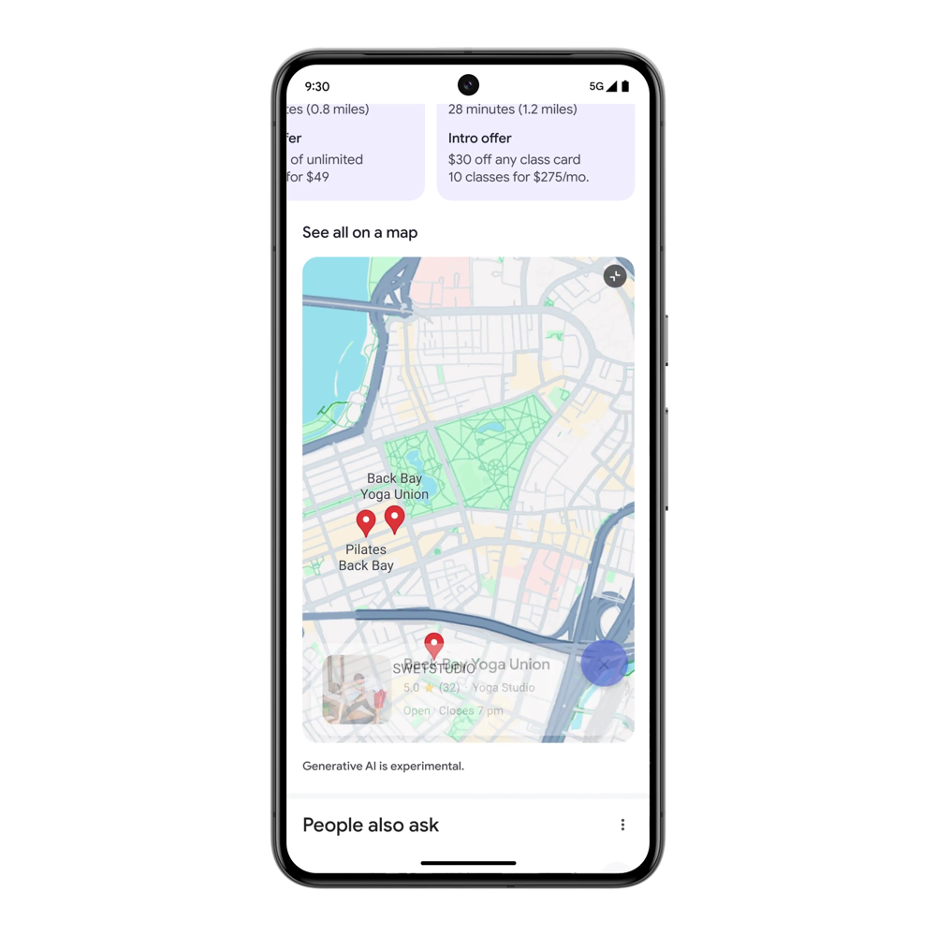May 2024 has been a landmark month for Generative AI, with OpenAI launching GPT-4 for the public and Google making headlines at their I/O event by announcing AI Overviews for US search results. These expanded AI Overviews, formerly known as SGE (Search Generative Experience), signify a major transformation in search. They pose intriguing questions: how will it reshape our roles as search specialists and advertisers, and what new possibilities will it unlock? Before diving in, let's provide you with more details about what the AI Overviews encompass.
Google’s AI Overviews are powered by Gemini, an AI model specifically designed for search functionalities. With this new feature, Google is stepping up their AI-powered search game, aiming to revolutionise how users find and interact with information. Google states that ‘Search will now offer capabilities that were previously unimaginable’. A few examples of the newest capacities are multi-step reasoning, strategic planning, and multimodal processing. Additionally, Google provides assistance with planning various activities, such as meal organisation and vacation planning.
Google is also introducing AI-organised results pages, which categorises useful information under unique, AI-generated headings, offering different perspectives and content formats. Initially, this feature will be available in the US for dining and recipes, with potential expansion to cover movies, music, books, hotels, shopping, and more in the future. With the European launch date still unclear, we're starting by following developments from afar. Simultaneously, we keep close communication with our US counterparts to understand how we can address this change as marketers.

Image source: Google Blog
What does this mean for Search and for advertisers?
With the introduction of AI overviews in search, Google aims to simplify a user’s journey by popping an AI-generated summary right at the top of your search results. Since the emergence of generative AI, the way users are searching the web is changing. During Google Marketing Live, Google claimed that with their AI Overviews, users are more satisfied with their results and AI Overviews lead to more quality clicks, where users spend more time on the site.
With this new search experience, Google is tapping into a couple of important trends when it comes to Search:
- Give me exactly what I want – Over the last 6 months, the number of long-tail queries (5+ words) grew 1.5 times faster than shorter queries. People who use generative AI tend to ask for more specific things.
- Complex search made easy – AI can help to put together more (relevant) pieces of information that usually would take the user multiple searches. It can help the users with recommendations or other information that go beyond the initial search query.
- Search beyond words – Why use words to describe what your looking for, when you can also take a picture of a video? Image search in Google is improving and AI allows you to ask questions in your videos.

This approach could shake things up for the performance of businesses (organic and paid), impacting how a brand shows up and impresses potential customers.
Now, these AI-powered views might look a bit different depending on what you're searching for, but one thing's for sure: that AI summary steals the spotlight at the very top of the page. But, here come a couple of challenges to watch out for:
- Emergence of New Competitors: With the focus shifting from content to quick answers, you might see some fresh faces popping up in the search results
- Transition from Keywords to Conversational Queries: Searches are getting chatty, evolving into more like conversations than just typing in keywords.
- Visibility & Traffic: These AI-powered results strut their stuff right at the top of the page, above or just below the ads. That means your regular old Google listing might get pushed down the page a bit. Users will have to scroll past the new AI section to find your site, potentially making it less visible.
How do we prepare for a future roll-out of AI-Powered Overviews?
Although a roll-out of AI Overviews in Google’s search results in the BeNeLux has not yet been confirmed, we want to be well-prepared for a possible launch. Consequently, we have been guiding our clients to future-proof their websites in Search by focusing more on:
SEO
Diversifying your content strategy
- Spread your info across different platforms and mediums to up your chances of it getting picked up by AI Overviews.
Enhancing engagement with multimedia
- Use High-Quality Images: Make sure your pics are on point and crystal clear.
- Create Complementary Videos: Whip up some vids that add value to your written stuff.
- Design Visual Infographics: Paint a clear picture with infographics to explain data and ideas.
Optimising multimedia for SEO
- Alt Text and Captions: Give all your multimedia some love with alt text, captions, and detailed descriptions.
- Seamless Integration: Blend images, videos, and infographics smoothly into your text to make it all flow together.
Focusing more on Q&A formats
- To boost the odds of your content getting featured by Google's AI, structure it in a Q&A format. Since AI overviews dish out direct answers, this trick can get your content seen.
Developing comprehensive topic overview pages
- Since Google's AI can handle complex queries, make super detailed overview pages covering the whole user journey. These pages can be goldmines for Google's AI overviews, putting your content front and center.
Enhancing technical SEO for effective crawling & indexing
- Google's AI models use common crawlers to crawl and index your content effectively. So, tweak your tech SEO to make sure everything's effectively accessible.
- Implement Structured Data to help search engines understand your content better and increase your chances of showing up in AI overviews.
Tracking and optimising for queries with AI overviews
- Keep an eye on search volumes for queries that already trigger AI overviews. Spot content gaps and chances to optimise. Focus on the most relevant terms and topics for your business, that Google's already highlighting with AI results.
Optimising product detail pages (PDPs)
- For queries where Google's showing off categories, guides, and reviews in AI overviews, your product pages could be in the spotlight. So, make sure those PDPs are looking sharp to grab users' attention.
SEA
Make sure you are matching longtail search queries
- According to Google, the number of longtail search queries (5+ words) is growing faster than shorttail search queries.
- If AI Overviews turns out to be a fitting solution, it will probably affect the way users start searching in Google, which will make the number of longtail search queries grow even higher
- If you want to keep matching those longtail search queries, improve your product feed (titles and descriptions), add more keywords or make use of Broad Match keywords (in combination with Smart Bidding) for a broader matching of search queries.
Create ad copy that focuses on giving advice
- Google’s new search experience promises to have better results when it comes to complex questions.
- To serve those new characteristics of search queries, also make sure you have ads or assets in place that address the recommendations or advice that your company can make.
Is Google’s new search experience going to change the way we manage search ads?
- For now, it seems that ads are becoming a part of the new search experience and AI overviews in particular. Which was expected, but yet unclear on how that would look like.
- Google presented examples of Search- and Shopping ads in a very similar fashion as PPC specialists are familiar with.
- More interesting would be to see if AI is able to show paid results for more longtail search queries that we would not have actively targeted before. AI might be able to help connecting your services or products better with very specific search queries.
Google's recent announcements are among the most significant we've witnessed in recent years. For the first time, we see clear examples of generative AI being integrated into Google’s search engine. Only time will reveal if this is Google's chosen path forward. On Thursday May 30, Google admitted that its AI Overviews feature requires improvement. Although the tech giant stated it conducted thorough testing of the feature prior to its release two weeks ago, Google conceded that the feature occasionally generates "some odd and erroneous overviews. For now, we can observe the changes in the US and prepare for similar adjustments when they reach Europe.

